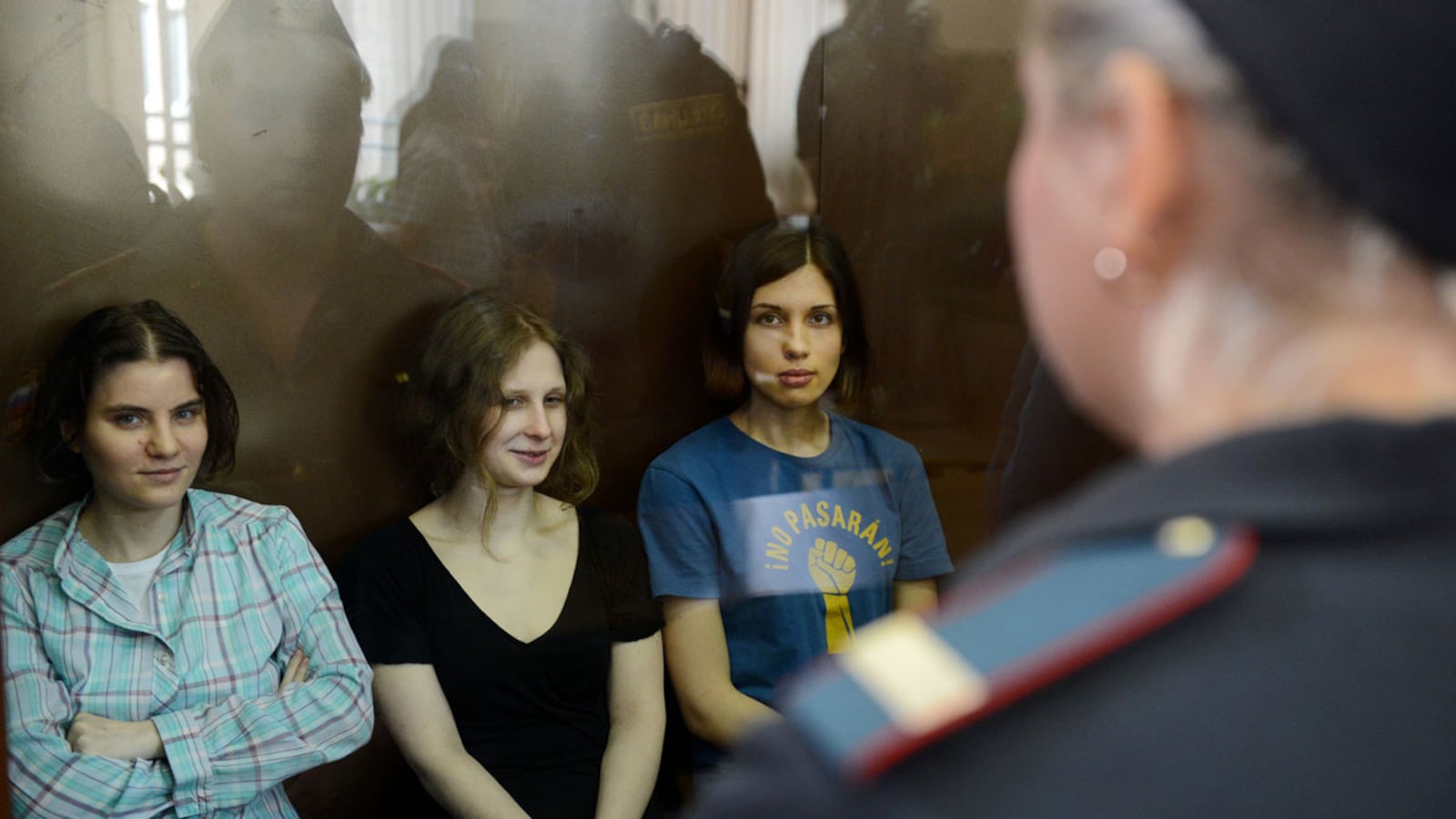The three members of Pussy Riot sentenced to two years in prison in a trial that attracted worldwide attention are asking the warden of their pretrial detention center to let them serve out their time in Moscow instead of at a remote penal colony hundreds of miles away.

More than 2,000 prisoners have died in or en route to Russian prisons in just the last six months, according to Russia’s prosecutor general. And the young women’s lawyers, who do not expect an Oct. 1 appeal of their August sentence for hooliganism to be successful, have received threatening messages from prison employees.
“We have been promised that the colonies ‘would be prepared’ to receive our clients. There is only one reading of it: their lives are in danger,” Violetta Volkova, a lawyer for the group, said in a phone interview Tuesday morning from Washington, D.C., where she was preparing to receive a John Lennon award on behalf of Pussy Riot from Yoko Ono.
Volkova said she was afraid that anything, “from rape to murder,” could transpire in the remote women’s prisons. The transportation stage from Moscow to a penal colony, known as the “etap” and filled with its own hazing rituals, is what rights defenders fear most. Twenty or more prisoners are packed into train compartments meant for four people, and such trips can last several days.
“The train stops at every jail along the way. The most violence takes place on the train and during the transit stops,” said Lev Ponamaryov, the leader of the For Human Rights movement, which monitors violations in Russian prisons.
Despite the dangers, Russian dissidents with prison experience going back to the gulag say Nadezhda Tolokonnikova, 22, Maria Alyokhina, 24, and Yekaterina Samutsevich, 29, should not have asked for favors from the system. “Don’t believe them, don’t fear them, don’t ask anything of them”—the three rules made famous among Soviet prisoners by Alexander Solzhenitsyn’s literature—remain true today, said Alexander Podrabinek.
A former political prisoner, Podrabinek served his five years in a Siberian gulag in the 1980s. The prison, he said, “turns its back for good” on those who cooperate with prison administrators or seek favors, and this tradition will never change. “The entire prison will defeat the girls if they make deals with the Moscow jail even once,” he said. “The prison’s telegraph will immediately send the news around to all the Russian jails.”
Going to a distant prison might not be that bad, he added. “For now, a majority of the prisoners, who are always well informed, respect Pussy Riot for their courage, so the girls shouldn’t ruin their reputation.”
Pussy Riot, who dared to sing an anti-Putin song in Red Square and then twice at Moscow churches, have indeed grown famous for their fearless spirit. Their “We are stronger than the state” statements from prison encouraged dozens of their fans to don short dresses, colorful tights, and balaclavas, and come out to public protests demanding freedom for the women. Well-articulated and balanced speeches by all three band members in court also made an impression on the Russian opposition, who praised them as future politicians. Pale and exhausted after a six-month investigation and a show trial, all three laughed when their sentence was read out in a Moscow court last month.
Yet their biggest challenge is ahead. “Whether they stay in a Moscow jail or serve their term in one of the colonies, they will be under constant pressure to reveal the names of the other Pussy Riot members,” said Alla Pokras, the head of Penal Reform International. Russian law enforcement is seeking the rest of the group, and two members have already fled the country.
Knowing how brave and stubborn the three jailed women are, however, the prison has no reason to count on their cooperation and therefore will likely refuse to let them stay in Moscow. Those who have lived under life-threatening pressure in prison understand Pussy Riot’s efforts to remain in the city. In March, the head of the Russia Behind Bars movement of prisoners’ relatives, Olga Romanova, received a message that her husband, the entrepreneur Alexei Kozlov, would be murdered as soon as he arrived in prison.
“When your client or loved one is facing death, you have to take every little opportunity to protect them,” Romanova said. She and her husband also asked the prison authorities to allow Kozlov to serve out his term in Moscow, under the close eye of human-rights activists, to no avail. “The prison authorities do not like those who cannot be forced to compromise,” she said.
Not that Pussy Riot asked for any easy life. Zoya Svetova, who visited them in jail a week ago with a public observers’ commission, said being locked up in the women’s ward of the Moscow jail is a hard-working, humiliating life. “If the country’s leaders decide to keep the women in Moscow, their job will be cleaning toilets, cooking, and serving other prisoners,” she said.
At least Tolokonnikova’s 4-year-old daughter and Alyokhina’s 6-year-old son would not have to travel for days by train to see their mothers but could visit them at the familiar Moscow No. 6 pretrial detention center, known as the Yellow Bastille.






